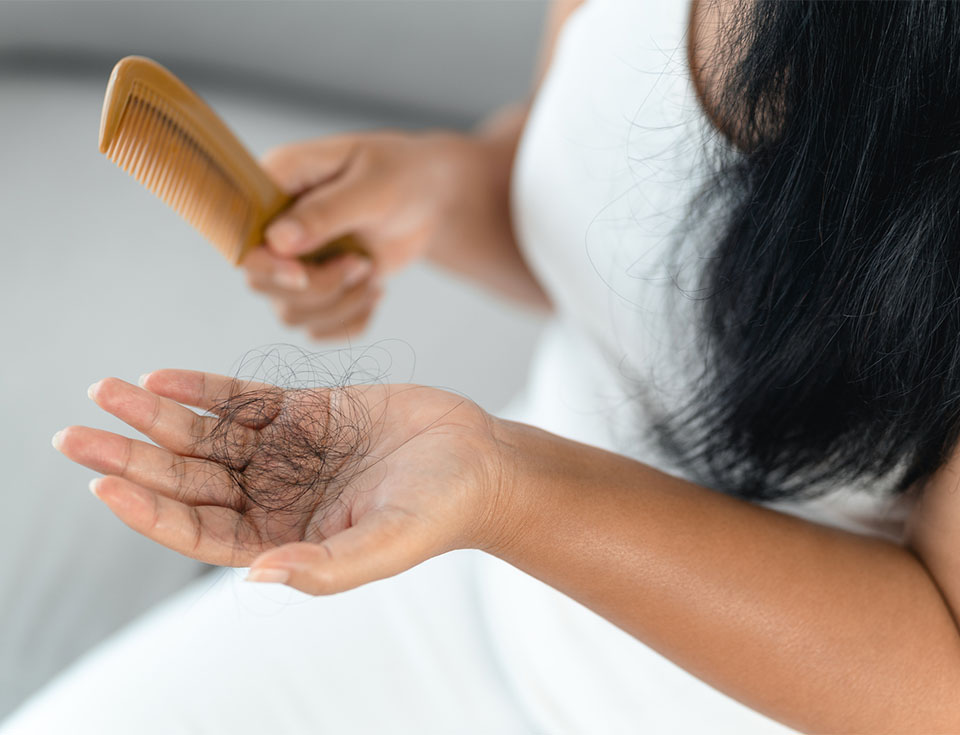It’s normal to lose hair as you age. Hair loss in women is usually caused by a decrease in hormones, which can happen as you approach menopause. However, other factors can cause hair loss in women, including stress, diet, and genetics.
In this blog post, we will discuss the causes and symptoms of hair loss in women, as well as treatment options.
Causes of Hair Loss in Women
- Decreased hormones: This is the most common cause of hair loss in women. As you approach menopause, your body produces less estrogen and progesterone, which can lead to a decrease in hair growth.
- Stress: When you’re stressed, your body releases cortisol, which can cause hair loss. Hair can also fall out when you’re going through emotional stress, such as grief or trauma.
- Diet: Hair needs nutrients to grow and stay healthy. If your diet is low in protein, vitamins A and B12, zinc, iron, or fatty acids like omega-three fatty acids (found in fish oil), then you may be more likely to experience hair loss.
- Genetics: Hair loss can sometimes be hereditary. If your parents or grandparents had noticeable hair loss, you may also experience it.
- Thyroid issues: An overactive or under-active thyroid can cause hair loss.
- Autoimmune diseases: Hair loss is a common symptom of autoimmune diseases, such as lupus and rheumatoid arthritis.
- Birth control pills: Some women experience hair loss after starting birth control pills. This is most likely due to the change in hormone levels.
Symptoms of Hair Loss in Women
- Hair thinning: You may start to notice that your hair is thinner than usual. You see lots of hair after shampooing, in the shower, or on your brush.
- Hair loss: You may start to lose hair in clumps. Hair may also come out when you brush it or style it.
- Bald patches: You may develop bald patches on your scalp where there is little or no hair growth.
- Difficulty styling hair: Your hair may be harder to style than normal, due to a decrease in its thickness and volume.
Treatment Options for Hair Loss in Women

- Medications: There are several medications available to treat hair loss in women, including minoxidil (Rogaine) and finasteride (Propecia). They can help regrow hair, but they must be used for several months to see results.
- Bio-identical hormone replacement therapy: When your hormones are out of balance, bio-identical hormone replacement therapy may help. This therapy involves taking hormones that are identical to the ones your body produces.
- Platelet Rich Plasma (PRP) Hair Restoration: PRP Hair Restoration is a treatment that uses your body’s growth factors to stimulate hair regrowth and healing. This is a simple process that begins with a blood draw from your arm. We then spin down the blood to separate the platelets and growth factors, which we inject into areas of hair loss on your scalp. Hair grows in a cyclical pattern, so it may take several treatments to see results. This treatment is now offered in our New Braunfels, San Antonio, and Boerne locations.
- Thyroid medications: Medications can help regulate your thyroid if you have an overactive or under-active thyroid. Hair loss may be reduced once the thyroid is back in balance.
- Collagen supplements: Collagen is the most abundant protein in your body, and it’s essential for hair growth. Hair loss can be reduced by taking collagen supplements or eating foods high in this nutrient (such as bone broth).
- Vitamins and minerals: Taking a multivitamin that includes vitamins A, B12, zinc, and iron can help promote hair growth. You can also speak to your doctor about taking specific supplements for hair loss.
If you’re concerned about thinning hair or other signs of aging, schedule a consultation with one of our providers in our newest location, New Braunfels, Texas! Call 830-627-7979 today.

